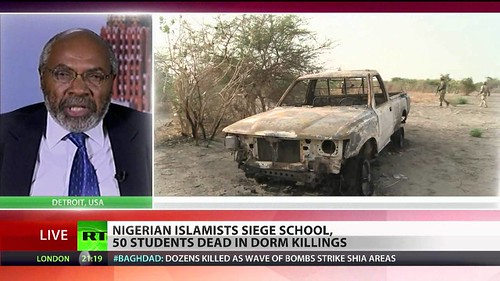
Abayomi Azikiwe, editor of the Pan-African News Wire, on RT worldwide satellite news television station. Azikiwe is a frequent contributor to international media., a photo by Pan-African News Wire File Photos on Flickr.
October 24, 2013 13:59
Rt.com
To watch this RT satellite television interview with Abayomi Azikiwe just click on the website below:
http://rt.com/op-edge/tunisia-transition-democracy-protests-government-675/
Thousands of Tunisians have again protested against the Islamist-led government. Despite the PM’s promise to resign, journalist Abayomi Azikiwe believes deeply ingrained political divisions remain.
Abayomi Azikiwe is editor of the Pan-African News Wire, and says that small things could lead to all-out chaos. He mentions two recent political assassinations, but also sees an example of the stepping up of security force attacks on Islamist guerrillas, believing it to be a sign that Tunisia might still be on the way to becoming a military-controlled state.
RT: The government has started talks with the opposition and new elections are on their way. So why have people taken to the streets again?
Abayomi Azikiwe: There’s a very politically tense situation inside Tunisia. We had today the murder of several police officers as well as civilians. President Marzouki has declared days of mourning in the country.
Tunisia’s been racked over the last several months with two major political assassinations. There’s a total breakdown within the governing structures of the country, between the more moderate Islamists – who dominate the government at this point, and also the secular and left forces who want a stable government. But there seem to be very serious divisions inside this ruling coalition in Tunisia.
RT: Could you outline some steps the country has taken on the road to democracy, and are they in enough to get started in the right direction?
AA: I think it’s a good move that they’ve decided to step down from the current rule; distancing themselves to provide some breathing space for additional political debate, as well as a new national election. However, I believe if the tensions increase… and they’re increasing attacks by the security forces against the Ansa al-Shariya – an Islamic guerrilla organization which has been involved in armed conflict with the security forces in Tunisia – then [those forces] will play a much more involved role in political developments in the country.
RT: Negotiators will have one month to adopt a new constitution, lay out new electoral laws and to establish a timetable for new elections. Do you think we can have confidence that they will accomplish this? And what can we expect from future negotiations?
AA: Hopefully they will be able to reach an agreement to go forward with the coalition government. But at the same time there are still some very deep and protracted differences between the Ennahda party – which is the dominant political force over the last two years, since the first post-Ben Ali elections were held – and some of the more secular organizations on the left. The assassinations of Belaid and Brahimi earlier this year exacerbated political contradictions inside Tunisia. So I think it’s going to be an extremely difficult task, but I think it can be done. But I think it’s going to be a very slow process and if these armed attacks continue then there’s going to be one major obstacle on the way to having free and fair elections as well as open debate.
RT: Do you think the upcoming elections will give the people confidence that there can be a stable government in a stable Tunisia?
AA: I think they’ve taken the correct step by dissolving the current government, but it remains to be seen whether the various contending political parties in the country are able to have trust among each other and also trust within the political system, so they can move forward on a stable basis, that is the only real solution I see.
The statements, views and opinions expressed in this column are solely those of the author and do not necessarily represent those of RT.
No comments:
Post a Comment